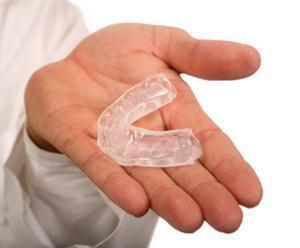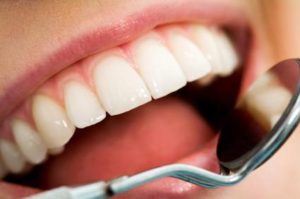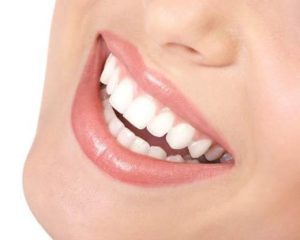Huronia Dental Centre
Procedures

Does your sleeping partner snore? Does their breathing sound shallow? Do you notice their breathing stopping and starting? If you answered yes to any of these questions it may be a sign of a breathing disorder called Sleep Apnea. What is Snoring? Snoring is a result of turbulent airflow at the back of the throat when the muscles of the airway collapse while sleeping. Snoring affects the sleep of both the snorer and the bed partner. Studies show that bed partners of snorers average one hour less sleep every night than normal. Snorers are often less rested during the day than they could be. What is Sleep Apnea? Obstructive Sleep Apnea (OSA) is the result of the tissues at the back of the throat actually blocking the airway up to hundreds of times every night. It affects 4% of men and 2% of women. The resulting disruption of normal sleep pattern may cause daytime fatigue, memory problems and lack of energy. Studies show that people with OSA have a greater risk of accidents while driving or while at work. The repeated drop in blood oxygen levels in the night can have serious health consequences. Dr. Farquhar has ran the Introduction to Dental Sleep Medicine program at the American Academy of Dental Sleep Medicine's annual scientific meeting where 160 dentists from around North America attended the introductory course. Dr. Farquhar has been involved with teaching treatment of snoring and sleep apnea to other dentists for more than two years.

Periodontal disease (Periodontitis) damages the gums, ligaments and bone structure that support your teeth. It is caused by the bacterial infection associated with plaque. Plaque is that clear sticky substance that builds throughout the day on your teeth which is removed by regular brushing and flossing. Plaque that isn't cleaned off through brushing and flossing hardens into tartar which must be removed by a dentist through 'scaling'. Tartar that is left on the teeth can cause infection that will accumulate below the gum line. Over time the bacterial infection can result in the gums separating from their grip on your teeth causing 'pockets' between your gum and tooth to develop. These 'pockets' make room for more infection and additional problems to occur including receding and pain in gum tissue as well as loosened damaged teeth and constant breath issues and even tooth loss. Periodontal disease can be treated and like most ailments, the earlier it is detected the better. The early stage of periodontal disease is Gingivitis. Gingivitis is extremely common and usually defined by mild gum irritation, minor bleeding during regular brushing and flossing and occasional bad breath caused by the gum infection. Gingivitis is caused by the bacteria from plaque under the gum line. Gingivitis is controllable and treatable with regular brushing and routine dental visits for a thorough cleaning. Gingivitis left untreated can spread to the bone structure that supports your teeth. This is where periodontal disease sets in. As the infection progresses 'pocket' are formed between your tooth and gum, allowing tartar, bacterial and infection to accumulate and damage the underlying bone. As the Periodontitis advances the 'pockets' deepen allowing the infection to worsen and damage to increase. Moderate Periodontitis occurs as the 'pocket' deepens down the root the gum separates further from the tooth often causing it to be noticeably receded and tender and the bone holding the tooth in place may be up to 1/3 lost. Allowed to advance, the bone destruction will continue and the tooth will loosen even to the point of falling out or requiring extraction. What to look for: Gums that bleed during normal (even gentle) brushing and flossing Gums that are tender, sensitive or even painful to the touch Gums that are swollen Gums that appear shiny or bright red (like in many infections) Gums that are receding Teeth that are loose in an adult Teeth that appear unusually long (due to receded gum) Frequent or continuous bad breath Overall discomfort in the mouth

If you've enrolled your child or yourself into a contact sport or activity, you have undoubtedly created a list of safety equipment you will need. If a mouth guard isn't on your list of equipment, add it now! Sports Mouthguards in Midland, Ontario Your child should be protected from a young age to avoid tooth loss and other oral injuries. Mouthguards provide more than protection from tooth fracture. They prevent the lower jaw from impacting into the upper jaw averting major injuries such as concussions, jaw fractures, neck injuries as well as limiting bruising and laceration of the lips and cheeks. While over the counter mouth guards are available and offer some protection, we suggest speaking to our team about a custom fitted mouth guard. A professionally created mouth guard will protect the teeth, gums and bone structure by molding properly during use. Over the counter versions may prevent chipped or damaged teeth, but are not as effective at protect the important structures that support the teeth. The team at Huronia Dental Centre can create mouth guards for you and your children ensuring that your activities are safer for your smile.

A missing tooth is more than just an aesthetic concern. All too often an individual missing a tooth in the back of their mouth will have an out of site out of mind mentality. This can be a huge oversight! It is more appropriate to think of a missing tooth as a space where a tooth used to be. Above and beyond aesthetics that tooth's purpose included acting as a chewing surface, holding its place with regards to adjacent teeth, maintaining the bone structure where it was rooted along with many other structural and preventative roles. Without that tooth in place surrounding teeth can shift causing gaps and making decay more likely, bone loss and damage can occur, the area can become more apt to periodontal disease and the list goes on. To avoid bone loss, maintain the proper spacing of your teeth and avoid the maladies associated with a missing tooth an implant may be required. An implant will take the place or more appropriately fill the space that your missing tooth once held. A dental implant is a small prosthetic post that is placed into the bone of the upper or lower jaw. The post functions as the root portion of the lost natural tooth and serves as an anchor for replacement tooth. Once the post has settled an artificial tooth is attached to fill the space that was once your missing tooth. A dental implant often gives back a patient's confidence in their smile, the ability to eat comfortably and a clean, healthy oral environment. Dental implants look and feel exactly like natural teeth, no one other than you and your dentist will be able to tell the difference.

A crown is a covering that sits over the top of the tooth creating a tooth surface to protect, cover, seal and strengthen your tooth. Crowns are used in many different scenarios as they are effective and often allow us to save a tooth rather than turning to implants. Situations where a crown may be the solution include; Larger fillings that have broken down or have formed decay around them may need a crown to save the tooth. A cracked tooth may need a crown to hold it together. Be careful not to wait too long as an untreated cracked tooth can become sensitive or eventually break. Teeth that are very sensitive, either from a lot of "wear", or from receded gums, sometimes require crowns to seal and protect the teeth from hot and cold sensitivity. A tooth that has broken may be too weak to hold a filling. A crown will hold the tooth together and prevent it from breaking again. If the fracture is too deep, Root Canal Therapy may be required before the tooth is crowned. A tooth that has undergone Root Canal Therapy will need a crown to properly seal and protect the tooth. A crown may be the solution to saving that tooth; Dr. Farquhar will evaluate your needs depending on your oral health and the condition of your teeth.

If your tooth is in need of repair, you understand the importance of treatment to eliminate any discomfort you are experiencing and to avoid future, more serious problems. Single Visit Dental Restorations in Midland Ontario If you could be in and out of our office in a single visit with a permanent, all ceramic crown, onlay, or veneer why would you want a temporary restoration and second visit! Your oral health is our priority, yet we recognize that your busy lifestyle may not have room for repeat visits to our office to complete a single treatment. That is among the many reasons we have added single visit ceramic restorations using the CEREC by Sirona to the technology we can offer you. CEREC creates a ceramic restoration for your tooth that is milled in our office while you watch! Once bonded to your tooth, it is stronger than the original enamel. There are no dark lines at the gum and the natural colour is unmatched by any lab made material. Best of all: You can have your tooth fixed in 1 hour and be eating that same day. No Temporaries and No Waiting for the lab. Finishing Treatments in a Single Visit Means: Fewer Injections Less Drilling Less Time Needed Out of Your Day! Advantages of CEREC Restorations Include: They look like real enamel No Sensitivity - Even switching from hot to cold produces no pain Decay underneath these restorations is rare They wear down at the same rate as your teeth Economical because they last a long time! Biocompatible - For those with allergies and sensitivity, this is ideal

Bonding is a composite resin filling placed on your teeth. Composites are the materials used for restoring decayed teeth, making cosmetic improvements and even changing the colour and reshaping of teeth. Cosmetic Dentistry in Midland, Ontario Bonding is a versatile treatment and can be used to: Repair decayed teeth Fix cracked or chipped teeth Close gaps between your teeth Change the shape of your teeth Improve the look of discoloured teeth Bonding has become a common procedure and can usually be completed in one short visit! Bonding will cover any natural flaws by first applying a thin coating on the front surface of your teeth to which the bonding material is applied. Bonding can be sculpted, coloured and shaped to provide the look and feel that you desire. Next time you're in the office ask Dr. Farquhar if bonding can improve your smile.
